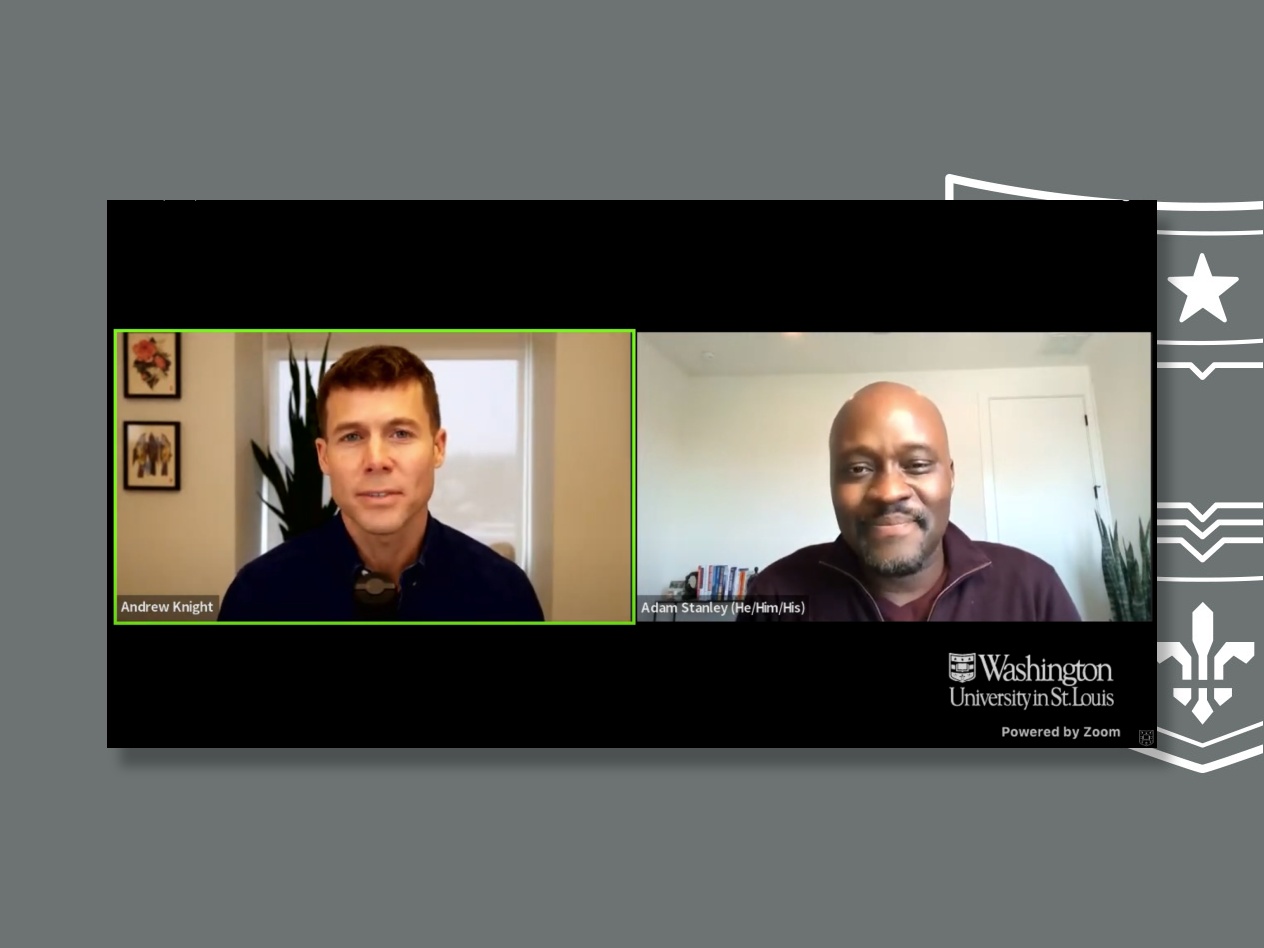Like a boss: How building team respect is Adam Stanley’s cup of ‘TEA’
- February 25, 2022
- By Kurt Greenbaum
- 4 minute read

Adam Stanley knows exactly when and how he decided not to be a jerk as a boss—the time he decided to opt-out of a group where he was being encouraged not to be himself, not to be authentically the nice guy he wanted to be. That moment was one of the lessons he shared in his recent appearance at “Like a Boss,” a Leadership Perspectives event for WashU Olin Business School on February 17, 2022.
Stanley, BSBA ’95, is the retired CIO and chief digital officer for Cushman & Wakefield, a position he held after a varied career in consulting, insurance and banking. He is now chief experience officer for Teach For America.
He appeared on the virtual Olin stage with Andrew Knight, professor of organizational behavior, to discuss the elements of a great team, how to build a dream team and how to keep it thriving.
Stanley spoke about strategies for managing diverse groups, the ingredients for building respectful team relationships, the need for “closed-loop communication” among team members, and the challenges of working with teams in a virtual environment—including the ways remote work is fundamentally different when it’s no longer a choice. He also addressed what choices he made that influenced his career path.
This is a selection of questions he addressed. Watch the full video for more.
What is your definition of success when it comes to teamwork?
“When I think about a team, the best teams have a clear understanding of what the challenge or the opportunity is. They understand the ideal set of outcomes, but they’re willing to admit that sometimes things are planned and outcomes are expected, and sometimes they’re more serendipitous. And sometimes you just luck out. The journey to get there may be complex, it may be tough, it may be easy sometimes and it may be completely different than what you’ve expected. Successful teams, they thrive in those kinds of environments.”
Is success whether a team reached its North Star or is it more nuanced?
Stanley recalled a conversation with the chief of medicine, the head of nursing and the emergency room attending physician at a Boston hospital, a conversation that acknowledged the obvious North Star in dealing with an ER patient.
Once the group saves the patient, “the temptation would be to say we accomplished our goal, but if you just do that without taking a minute to close the loop and confirm what went well, what didn’t go well, you’ve missed a learning opportunity. Especially in an agile environment, learning from how you did it is almost as important as the fact that you actually did it. Because one is repeatable. The way you got there is really the learning.”
Are there things that are unique to certain industry sectors as they relate to effective teamwork?
After working in consulting, insurance, banking, and now in nonprofit work, Stanley said, “what’s funny to me is that everyone thinks they’re so special. But they’re not. Now more than ever I’m learning—I’m in a nonprofit education-focused institution—and I come in and think everything is going to be completely different.
“But it’s not. I tell people all the time, the greatest muscle expansion I had that’s been most consistently helpful from job to job was my time as managing editor of Student Life newspaper at Washington University. As odd as that sounds, the intellectual curiosity, the ability to ask questions about something completely new to you, that’s completely consistent across industries, across jobs, across any opportunity.”
Is there a core set of generalizable ingredients to a successful team?
“One thing that’s worked for me, and it’s so incredibly simple — and I’m actually drinking tea right — there’s an acronym that I’ve used throughout my career which is TEA. It’s based on a premise I’ve said for years and years.
“Respect is the non-negotiable foundation behind any team, any initiative any element of work. That’s the foundation. If the foundation is respect, what are the ingredients of that foundation?
“Trust is first. You have to trust your team members. That is earned. It’s hard to earn, and it’s really easy to lose. Empowerment is the next ingredient. A lot of people misuse that word. The vast majority of people who empower their team members don’t train them and don’t actually give them the tools and the training and the support.
“Finally, it’s accountability and having metrics you can use to measure the success of whatever the initiative was. If you have those three ingredients, teams just work so much better, and I think that’s completely transferrable from organization to organization.”
Leadership Perspectives: Like a boss
What makes a great team great?
Media inquiries
For assistance with media inquiries and to find faculty experts, please contact Washington University Marketing & Communications.
Monday–Friday, 8:30 to 5 p.m.
Sara Savat
Senior News Director, Business and Social Sciences
